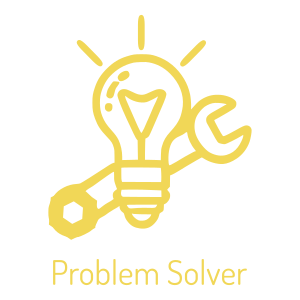
Accepting
The Accepting habit type is defined by their calm, patient, and steady approach to achieving goals. They excel in environments where they can work at a consistent, sustainable pace without feeling rushed or pressured. Known for their ability to embrace circumstances as they come, they find ways to adapt without losing sight of their objectives. However, their natural acceptance of situations can sometimes lead to a reluctance to push for change or explore new possibilities. By pairing their steady nature with proactive goal-setting and occasional bursts of ambition, the Accepting type can achieve remarkable balance and long-term success.
Have you found your Tailored Approach?

Accepting
The Accepting individual approaches challenges with patience and understanding, recognizing that progress may not always be linear. Their strength lies in their ability to stay committed to long-term goals while maintaining a positive attitude toward setbacks. They accept difficulties as part of the journey and focus on personal growth, making them resilient and able to move forward with grace and perseverance.
Have you found your
Tailored Approach?
The Accepting's Action Center
Action Catalysts

Action Constraints

Steady Routines: A consistent daily structure helps maintain focus and productivity over time.
Supportive Environments: Working in encouraging, low-pressure settings allows them to thrive.
Collaborative Dynamics: Teamwork with empathetic individuals fosters mutual growth and understanding.
Positive Reinforcement: Regular recognition for efforts and achievements boosts their motivation.
Incremental Progress: Breaking goals into manageable steps keeps them aligned and committed.
Resistance to Change: A preference for stability may hinder adaptability when circumstances shift.
Lack of Urgency: A slow-paced approach can sometimes lead to missed opportunities or delays.
Over-Reliance on Comfort Zones: Staying within familiar patterns may limit innovation and growth.
Avoidance of Conflict: A tendency to sidestep challenges can stall progress in critical areas.
Procrastination: Delaying decisions or actions may arise when immediate results aren’t required.
The Accepting's Action Center
Action Catalysts

Steady Routines: A consistent daily structure helps maintain focus and productivity over time.
Supportive Environments: Working in encouraging, low-pressure settings allows them to thrive.
Collaborative Dynamics: Teamwork with empathetic individuals fosters mutual growth and understanding.
Positive Reinforcement: Regular recognition for efforts and achievements boosts their motivation.
Incremental Progress: Breaking goals into manageable steps keeps them aligned and committed.
Action Constraints

Resistance to Change: A preference for stability may hinder adaptability when circumstances shift.
Lack of Urgency: A slow-paced approach can sometimes lead to missed opportunities or delays.
Over-Reliance on Comfort Zones: Staying within familiar patterns may limit innovation and growth.
Avoidance of Conflict: A tendency to sidestep challenges can stall progress in critical areas.
Procrastination: Delaying decisions or actions may arise when immediate results aren’t required.
Find Your Outcome Today!
Consistency for the Accepting Type
With regards to Consistency, the Accepting type maintains consistency through their steady and patient approach to tasks, finding comfort in routines that promote long-term progress. They excel at creating sustainable habits, focusing on incremental steps rather than rapid, dramatic changes. Their ability to remain calm and composed helps them stay on track, even in the face of challenges or setbacks. However, their preference for stability can sometimes make it difficult to embrace necessary changes or seize time-sensitive opportunities. By balancing their dependable nature with occasional bursts of proactive effort, the Accepting type can achieve both consistency and growth with remarkable ease.
Accepting Type + Personality Strength: Mind & Body


Mental Optimization
Physical Optimization
Reflective Journaling: Write daily reflections to process thoughts and maintain focus on long-term goals.
Mindful Planning Sessions: Use calm, undisturbed environments to map out achievable, step-by-step plans.
Quiet Goal Visualization: Dedicate time to visualizing success in a way that feels natural and unhurried.
Gentle Fitness Routines: Engage in slow-paced exercises like yoga or walking to maintain a steady physical regimen.
Nature-Based Activities: Incorporate outdoor activities, such as hiking or gardening, to promote both mental and physical well-being.
Consistency Through Simplicity: Stick to straightforward routines like morning stretches or evening cooldowns for steady results.


Mental Optimization
Physical Optimization
Adaptive Reflection Practices: Alternate between solo and light collaborative brainstorming sessions to stay mentally engaged.
Progress-Focused Journals: Keep track of incremental achievements to reinforce commitment and confidence.
Relaxed Strategy Reviews: Schedule routine, pressure-free reviews to reassess goals and strategies.
Flexible Wellness Practices: Alternate between solo workouts and small group activities to match changing energy levels.
Holistic Fitness Routines: Combine mindfulness practices with physical activity, such as yoga or tai chi.
Relaxed Progress Tracking: Use low-pressure tools to monitor fitness goals while maintaining a calm approach.


Mental Optimization
Physical Optimization
Balance-Oriented Brainstorming: Alternate between independent thinking and group discussions for clarity and motivation.
Flexible Check-In Systems: Use periodic self-check-ins to ensure alignment with broader goals.
Calm Progress Evaluations: Create a relaxed, structured method for assessing ongoing tasks and adjusting plans.
Balanced Workout Plans: Mix solo and group activities, like jogging alone and joining a fitness class weekly.
Routine Health Checkpoints: Set periodic assessments for gradual adjustments to fitness routines.
Moderate Physical Goals: Establish manageable milestones that align with overall wellness objectives.


Mental Optimization
Physical Optimization
Social Reflection Groups: Join small, supportive groups to share progress and gather inspiration.
Interactive Goal Setting: Use engaging discussions to clarify and commit to long-term objectives.
Dynamic Strategy Feedback: Incorporate input from trusted peers to refine and enhance your mental approach.
Community Fitness Challenges: Participate in social wellness events, like charity walks or fitness fairs, to maintain physical consistency.
Dynamic Partner Activities: Pair with a workout buddy to combine social interaction with steady physical improvement.
Collaborative Wellness Practices: Join group fitness classes or health workshops for a mix of accountability and fun.


Mental Optimization
Physical Optimization
Community Vision Sessions: Host or participate in collaborative goal-setting events to energize and inspire focus.
Public Accountability Statements: Share commitments with friends or colleagues for added motivation.
Group Milestone Celebrations: Use team celebrations to mark progress and stay committed to larger goals.
Team Sports Engagement: Commit to regular participation in casual team sports to maintain consistency and energy.
Interactive Group Classes: Attend vibrant group fitness sessions to stay motivated and engaged.
Event-Oriented Training: Prepare for marathons, fun runs, or similar community events to stay consistently active.
Accepting Type + Real Estate Strategy:
Lead Generation & CE Courses


Lead Generation Suggestions
CE Course Suggestions
Routine Data Review: Develop a schedule for regularly analyzing market trends and lead behavior.
Steady Nurturing Campaigns: Design long-term campaigns that gradually build trust with potential clients.
Incremental CRM Updates: Use consistent updates to track lead progress and refine outreach strategies.
Market Stability Analysis: Courses on understanding long-term trends in real estate markets.
Steady Transaction Management: Training on efficient, organized approaches to contract and compliance management.
CRM Utilization for Growth: Classes on leveraging CRM tools for gradual lead nurturing.


Lead Generation Suggestions
CE Course Suggestions
Challenge-Oriented Content: Create resources that address common real estate challenges for leads over time.
Long-Term Relationship Focus: Establish a methodical plan for maintaining contact with leads facing unique obstacles.
Gradual Value Delivery: Share solutions progressively to keep leads engaged and reassured.
Proactive Problem-Solving: Training on addressing client challenges in a calm, step-by-step manner.
Risk Mitigation Mastery: Courses on evaluating and handling risks with methodical strategies.
Solution-Based Marketing: Learning to design campaigns that provide incremental, actionable solutions.


Lead Generation Suggestions
CE Course Suggestions
Connection-First Campaigns: Design lead funnels that emphasize personal connections and trust-building.
Consistency Through Personal Touch: Use handwritten notes or one-on-one interactions to sustain relationships.
Referral-Based Growth Plans: Focus on cultivating steady referrals from satisfied clients and contacts.
Referral Building Strategies: Classes on developing and sustaining a client referral network.
Cultural Awareness in Real Estate: Training to connect with diverse clients through patience and understanding.
Client Loyalty Programs: Learning to design long-term programs that reward repeat clients and referrals.


Lead Generation Suggestions
CE Course Suggestions
Urgency-Framed Campaigns: Use gentle yet clear calls to action to encourage timely decisions from leads.
Prioritized Follow-Up Systems: Develop routines for consistently engaging high-potential leads.
Trust-Based Conversion Tactics: Use a reassuring, steady approach to convert leads into committed clients.
Gentle Closing Techniques: Courses on closing deals with a calm yet firm approach to build trust.
Time Management for Conversions: Training on staying consistent and efficient in closing processes.
Sales Psychology Fundamentals: Understanding how to gradually guide clients to make decisions.


Lead Generation Suggestions
CE Course Suggestions
Community-Driven Engagement: Build relationships by participating in or hosting regular community events.
Social Outreach Consistency: Post regularly on social platforms to maintain visibility and engagement with leads.
Gradual Network Expansion: Steadily grow your professional network through consistent outreach and collaboration.
Event Planning Mastery: Training on organizing community events for consistent client engagement.
Brand Visibility Strategies: Learning to maintain steady presence on social platforms and in local communities.
Storytelling for Connections: Courses on crafting authentic narratives to sustain interest and trust.
Find Your Outcome Combinations Today!
Commitment for the Accepting Type
The Accepting type embodies Commitment through their steady and reliable approach, excelling in environments that allow for gradual, thoughtful progress. They are patient and composed, which helps them stay dedicated to their goals even when faced with challenges. Their ability to accept circumstances as they are enables them to adapt without losing sight of their objectives, fostering long-term success. However, their preference for stability can occasionally lead to hesitation in making bold moves or embracing change. By combining their dependable nature with proactive goal-setting and intentional actions, the Accepting type can achieve sustained success while remaining true to their strengths.
Accepting Type + Personality Strength: Mind & Body


Mental Optimization
Physical Optimization
Steady Reflection Journals: Use a daily journal to document progress and reinforce long-term goals.
Mindful Visualization: Dedicate time to quietly envisioning success to maintain focus and resolve.
Consistent Quiet Learning: Engage in solo learning activities, like reading or listening to podcasts, to deepen knowledge and stay inspired.
Gentle Fitness Practices: Commit to low-impact routines like yoga or walking to maintain physical consistency.
Nature-Centric Workouts: Engage in outdoor activities, such as hiking or gardening, to connect with both body and mind.
Mindful Movement Rituals: Incorporate slow, intentional movements, like tai chi, to support physical and mental balance.


Mental Optimization
Physical Optimization
Progress-Based Planning: Create adaptable plans that prioritize incremental improvements.
Dual-Mode Goal Reviews: Alternate between personal reflection and light discussions with trusted individuals.
Structured Self-Affirmations: Develop a routine for affirming personal goals to stay mentally grounded.
Routine Physical Activities: Establish consistent workouts that blend flexibility and stability, like Pilates or swimming.
Holistic Wellness Practices: Combine mindfulness exercises with physical movement, such as yoga or stretching.
Progressive Goal Tracking: Monitor physical achievements regularly to ensure alignment with overall fitness aspirations.


Mental Optimization
Physical Optimization
Balanced Goal Setting: Blend independent thinking with occasional collaborative brainstorming to refine objectives.
Routine Mental Checkpoints: Schedule regular self-assessments to ensure alignment with long-term goals.
Motivation through Shared Experiences: Participate in small group discussions to gain new perspectives on personal aspirations.
Balanced Exercise Plans: Alternate between solo workouts and occasional small-group activities to stay motivated.
Adaptable Fitness Goals: Set long-term objectives with short-term milestones for consistent progress.
Varied Activity Rotations: Incorporate diverse workouts to maintain interest and physical consistency.


Mental Optimization
Physical Optimization
Collaborative Vision Sharing: Involve peers in discussions about long-term goals to reinforce your commitment.
Interactive Progress Tracking: Use group accountability systems to monitor and celebrate milestones.
Engaged Feedback Cycles: Gather input from others to refine and strengthen your mental approach to goals.
Group Fitness Challenges: Participate in social fitness activities, such as fitness classes or team challenges, for steady engagement.
Community-Focused Training: Join events like charity runs to maintain motivation and connection.
Accountability Partners: Work with a fitness buddy to track progress and stay committed.


Mental Optimization
Physical Optimization
Public Goal Declarations: Share commitments with a community or network to maintain focus and accountability.
Dynamic Brainstorming Groups: Join active discussions to gather insights and strengthen your resolve.
Team-Oriented Goal Alignment: Work within a group to align personal objectives with shared outcomes.
Team Sports Engagement: Commit to regular participation in community sports leagues for physical and social fulfillment.
High-Energy Group Classes: Attend interactive classes like dance or spin to maintain physical consistency.
Event-Oriented Training Plans: Prepare for races, marathons, or community challenges to sustain long-term focus.
Accepting Type + Real Estate Strategy: Lead Generation & CE Courses


Lead Generation Suggestions
CE Course Suggestions
Long-Term Market Campaigns: Develop extended campaigns that focus on nurturing leads over time.
Steady Data Monitoring: Consistently review analytics to fine-tune and maintain effective strategies.
Organized Outreach Schedules: Use a structured, routine approach for regular client engagement.
Data-Driven Strategies: Advanced courses on long-term analytics and market trend analysis.
CRM Mastery: Training on utilizing CRM tools for consistent lead tracking and management.
Organizational Efficiency: Classes focused on creating workflows that align with steady business practices.


Lead Generation Suggestions
CE Course Suggestions
Solution-Centric Marketing: Create campaigns that provide gradual, actionable solutions to client challenges.
Consistent Feedback Loops: Use ongoing lead feedback to refine outreach efforts and build trust.
Challenge-Specific Funnels: Design lead funnels that address unique problems over time to ensure lasting impact.
Gradual Problem-Solving Techniques: Courses on addressing client challenges with step-by-step solutions.
Adaptive Risk Management: Training on evaluating risks and creating sustainable mitigation plans.
Solution-Based Marketing: Learning to design campaigns that cater to solving client-specific problems.


Lead Generation Suggestions
CE Course Suggestions
Trust-Building Strategies: Focus on outreach, like personalized emails or calls, to strengthen long-term relationships.
Referral System Maintenance: Develop and sustain a reliable network of client referrals through consistent follow-up.
Community Engagement Programs: Participate in or host regular events to foster meaningful connections with potential clients.
Trust-Based Networking: Classes on building strong, lasting client relationships through authentic engagement.
Referral Program Optimization: Training on enhancing referral systems to ensure consistent growth.
Diverse Client Communication: Courses on maintaining effective communication across various demographics.


Lead Generation Suggestions
CE Course Suggestions
Gradual Conversion Campaigns: Build marketing strategies that balance urgency with patience to respect client decision timelines.
Steady Closing Frameworks: Use structured, reliable follow-ups to encourage conversions without undue pressure.
Goal-Oriented Lead Prioritization: Focus on leads that align with both immediate and long-term objectives.
Steady Closing Techniques: Training on closing deals without creating high-pressure situations.
Long-Term Sales Planning: Classes on designing sustainable sales strategies that balance urgency and patience.
Time Management for Closers: Learning to stay consistent and effective in managing multiple transactions.


Lead Generation Suggestions
CE Course Suggestions
Community-Centric Outreach: Host regular events to build connections while showcasing your approachable personality.
Consistent Social Media Presence: Maintain visibility through routine, engaging posts that connect with diverse audiences.
Collaborative Lead Opportunities: Partner with other professionals to nurture leads in a steady, sustainable way.
Event-Based Networking: Training on organizing regular events to build and maintain client connections.
Storytelling for Trust: Classes on crafting narratives that resonate with clients to foster long-term relationships.
Sustainable Social Media Strategies: Courses on creating consistent, engaging content for lead generation.





